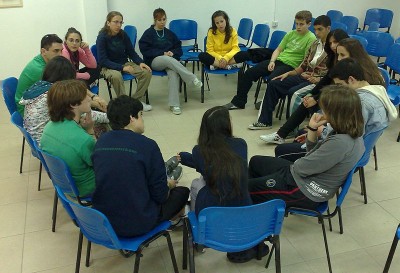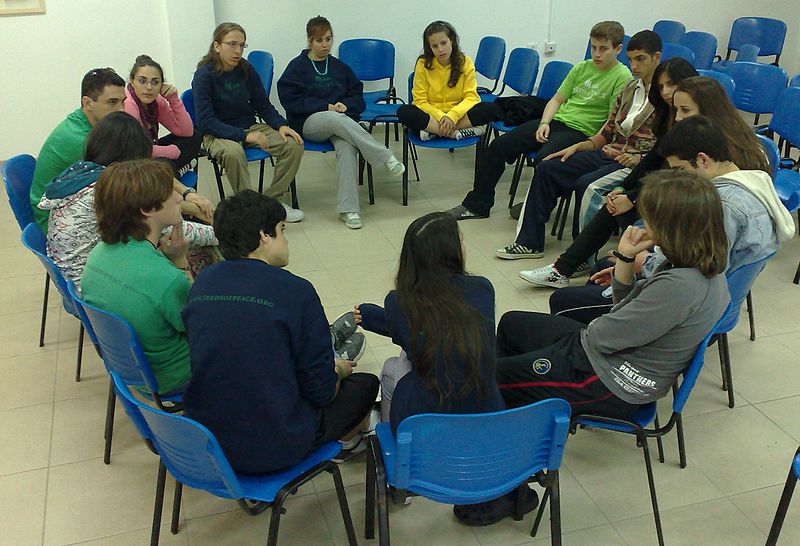
In my article, “Together We Can”, I called for joint peace efforts among college student clubs, especially those with differing views on the Israeli-Palestinian conflict. I relayed an example where I invited Students for Justice in Palestine to join the pro-Israel group at my college in New York for a debate, or ‘mock peace talk.’ However, in an e-mail to their club members, they stated they would bring in a speaker to explain why, “S.J.P. refuses to cooperate with Zionist groups, like Hillel.’ Tom Pessah provided that answer in “Why Palestinian Advocacy Groups Don’t Partner With Hillel.”
Tom refers to 3 ”points of unity” that S.J.P. agreed on in their national conference in 2010. He then states that “for us, to be pro-Palestinian means actively working to advance those rights for all parts of the Palestinian people.” He continues, once “I grappled with these issues…I was warmly accepted by my fellow Palestinian and non-Palestinian students in S.J.P.” Tom’s “all or nothing” response troubles me and feels counterproductive.
I think both sides can only benefit through collaborative efforts towards peace and supporting reconciliation efforts to help both the Israeli and Palestinian children have a better future.
Since these 3 points of unity are at the crux of S.J.P. acceptance of “dialogue,” let me review them:
1. Ending Israel’s occupation and colonization of all Arab lands and dismantling of the Wall;
2. Recognizing the fundamental rights of the Arab-Palestinian citizens of Israel to full equality; and
3. Respecting, protecting and promoting the rights of Palestinian refugees to return to their homes and properties as stipulated in UN resolution 194.
1. Occupation: Occupation was a direct result of the broader Arab-Israeli conflict. The term “occupation” often implies an aggressive effort to take over and rule a foreign people, but the Palestinian territories came under Israeli control during its defensive war in 1967. At that time, Arab states and Palestinian leadership refused to accept the Jewish state’s right to exist and mobilized to destroy it. As Israel defended itself, it drove back Jordanian, Egyptian and Syrian troops and captured the Territories that fell on Israel’s side of the armistice lines. Israel’s presence in the West Bank is not illegal. Under customary law and the Hague Conventions, Israel is obligated to administer the area until peace is achieved. UN Resolution 242 (1967) assumed Israel would administer the territories until Arab countries were willing to negotiate new, more secure borders. In the meantime, Israel continues to face terrorist threats from the area, necessitating its presence.
The PA and Hamas incite hatred of Jews and destruction of Israel in their media and speeches, and even name playgrounds after suicide bombers. Money received from the US and EU are used by the Palestinian Ministry of Prisoners to pay salaries to convicted criminals serving time in Israeli prisons. I don’t believe it’s wise to lower your shield when you know it will make you vulnerable to attacks.
The Wall (really, a fence in most areas) was built after the Second Intifada around 2001 in response to dozens of suicide bombings, and daily terrorist attacks that took the lives of more than 1,000 Israelis. The rate of suicide bombings in Israel reduced to almost zero after the wall was constructed. It saves not only Israeli, but Israeli-Arab and Palestinian lives. If one day peace is reached, the fence will be taken down, but until then, Israel’s safety concern for their civilians must be its number-one priority.
2. Arab-Israeli citizens of Israel have full rights under Israeli law. Their liberty, equality, freedom from discrimination, and freedom of religion are protected by law. Israel’s founding document states that it, “will ensure complete equality of social and political rights to all its inhabitants irrespective of religion, race or sex; it will guarantee freedom of religion, conscience, language, education and culture.” Israel’s citizens – Jewish or Muslim, Christian or Baha’i – have always had equal voting, ownership and political rights. Arab-Israelis were even elected to the first Knesset in 1949. Israeli-Arabs represent Israel in international contests, hold important positions in the government and military, and an Israeli-Arab Supreme Court Justice ruled in a case that convicted former Israeli president Moshe Katsav of misconduct.
3. The ”right of return” stipulates that the Palestinian refugees of the 1948 War and all their descendants now living in Jordan, the West Bank, Gaza, Syria, Lebanon, among other places, now numbering close to 5 million people, have the “right to return” to Israel—not to the proposed new State of Palestine within agreed-upon borders, but Israel. S.J.P. points to UN resolution 194 as an international recognition of this right, however, a closer look at the wording reveals that the resolution is a nonbinding suggestion stating that “refugees wishing to return to their homes and live at peace with their neighbours should be permitted to do so.” Nowhere in the resolution is there mention of any “right” to return. The return of a certain number of Palestinian refugees from among those who can show that they were actually displaced in 1948 and never resettled is certainly on the table for negotiation. However, extending the definition of a refugee to every single Palestinian alive today, regardless of resettlement status is a transparent tactic that turns the “right of return” into a euphemism for destroying the Jewish state. President Obama has said that the right of return” … would extinguish Israel as a Jewish state, and that is not an option.”
Jewish student groups are willing to talk about these issues and hope to come to some workable solutions. S.J.P.’s refusal to even speak to any groups on campus that don’t accept these 3 Points of Unity does not serve their stated goal of improving the lives of Palestinians. Rather, through these stances, S.J.P. encourages a self-righteous attitude of motivated reasoning that slakes its own ego at the expense of working towards an understanding of their perceived opponents.
I am sick and tired of hearing the horrible stories that result from the inability to resolve the Israeli-Palestinian conflict as it manifests on college campuses. It has carried on for way too long and must come to an end.
Tomer Kornfeld is a student at John Jay College of Criminal Justice.

